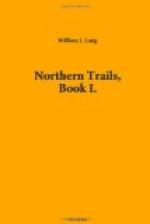From grasshoppers the cubs took to hunting the wood-mice that nested in the dry moss and swarmed on the edges of every thicket. This was keener hunting; for the wood-mouse moves like a ray of light, and always makes at least one false start to mislead any that may be watching for him. The cubs soon learned that when Tookhees appeared and dodged back again, as if frightened, it was not because he had seen them, but just because he always appears that way. So they crouched and hid, like a cat, and when a gray streak shot over the gray moss and vanished in a tuft of grass they leaped for the spot—and always found it vacant. For Tookhees always doubles on his trail, or burrows for a distance under the moss, and never hides where he disappears. It took the cubs a long while to find that out; and then they would creep and watch and listen till they could locate the game by a stir under the moss, and pounce upon it and nose it out from between their paws, just as they had done with the grasshoppers. And when they crunched it at last like a ripe plum under their teeth it was a delicious tidbit, worth all the trouble they had taken to get it. For your wolf, unlike the ferocious, grandmother-eating creature of the nursery, is at heart a peaceable fellow, most at home and most happy when mouse hunting.
There was another kind of this mouse chasing which furnished better sport and more juicy mouthfuls to the young cubs. Here and there on the Newfoundland mountains the snow lingers all summer long. In every northern hollow of the hills you see, from a distance, white patches no bigger than your hat sparkling in the sun; but when you climb there, after bear or caribou, you find great snow-fields, acres in extent




